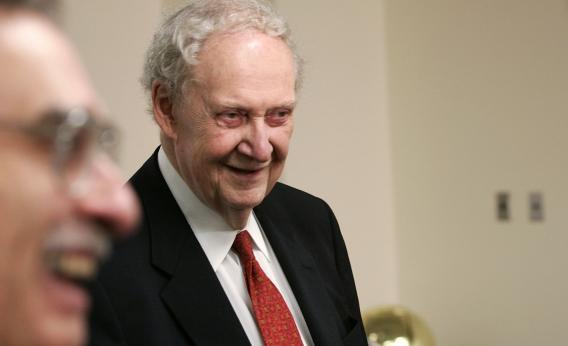I knew Bob Bork, though not very well, and I am familiar with his writings and of course with the debacle of his rejection for the Supreme Court in 1987. What makes that debacle not only interesting, but also of lasting influence, is that Bork was probably the best qualified nominee for the Supreme Court in the last 71 years, which is to say since 1941, when Robert H. Jackson—attorney general, former solicitor general, confidant of FDR, brilliant lawyer—was nominated. Bork had extensive experience in private practice. He was a leading law professor—a distinguished antitrust scholar, also the principal inventor of the judicial philosophy of “originalism” or “original intent,” and the foremost conservative critic of the Supreme Court. He was a former solicitor general of distinction. He had served, also with distinction, for five years as a judge of the U.S. Court of Appeals for the District of Columbia Circuit.
Because he was so well-qualified for the Supreme Court, he and his supporters attributed his rejection by the Senate to politics. He had posed as supremely apolitical, as just letting the chips fall where they may. And when he fell despite this, his supporters were energized to press all the harder for the appointment of reliable conservatives, as the liberals had shown that politics was what mattered to them in the selection of justices.
Of course the opposition to Bork was political. But Bork was political to his core. (A tipoff is the fact that he didn’t want to be a court of appeals judge; he accepted the appointment only because the Reagan administration made it a condition of his being considered for the Supreme Court.) Most justices embrace judicial philosophies that are congenial to their personal values, experiences, temperament, ideology, and so forth. That is inevitable because a large fraction of the cases that the Supreme Court decides are indeterminate to neutral legal reasoning. The straightforward cases are resolved at lower levels of the American judiciary. There are no algorithms for deciding really difficult cases. Some judges don’t have strong feelings about most cases, but that doesn’t mean they’re the best judges.
Bork was ultraconservative, so the Democrats who opposed him, despite his qualifications, were being realistic about the court. Given his ability and experience, he would have raised the Court’s quality, but I wouldn’t criticize people who believe that quality has to be traded off against social consequences of Supreme Court appointments.
After his rejection, followed shortly by his resignation from the D.C. Circuit, Bork kept moving right, becoming preoccupied with what he believed to be the nation’s moral decline, and eventually converting to Roman Catholicism, while expressing concern with the modest signs of liberalism in the church. It was a very strange journey. He was not a pious type—for him to embrace “intelligent design,” as he did in his religious phase, was stunning.
Still, a big figure, a major player in the political-legal realm, on balance, I think, a national asset. And if he had been confirmed, his death today (or retirement any time within the last four years) would have offered President Obama an opportunity to make a truly transformative appointment to the Supreme Court.
